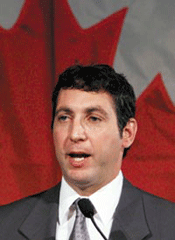
In February 2005, the Senate Committee on Transport and Communications visited Vancouver as part of its cross-country study of the Canadian news media. It heard nearly a dozen presentations bemoaning the fact that one company -- CanWest Global Communications -- has a near stranglehold on Vancouver news media. And it heard nearly a dozen complaints that this unprecedented concentration limits the diversity of sources and opinions available to Vancouver news consumers. "Frighteningly powerful" and "debilitating for voices" were how two presenters framed the situation.
So you would expect this outpouring of concern to be reflected in the committee's final report, which was released on June 21.
But you would be wrong. The Liberal-dominated committee -- and the commercial media reporting the study -- go after the CBC instead. The public broadcaster should get out of sports programming and give up its advertising revenues, the committee recommends. They say to replace the advertising dollars with more public dollars: a recommendation that hasn't a hope of being implemented.
The committee wrote that the "core" of its work concerns the "influence on news and information of media ownership in Canada." The senators began looking at the industry after CanWest acquired most of Canada's major dailies and Bell Globemedia took control of the CTV television network and the Globe and Mail.
But the study's release was framed around the alleged failings of Canada's public broadcaster.
The senators did a classic bait-and-switch ploy: say you're going to do one thing and then do something else to take attention away from your original goal. And in this case, their original goal was to examine media concentration.
Too bad for BC
One explanation is that the committee downplayed its mandate and targeted the CBC instead in recognition of the new political masters in Ottawa. The CBC-loathers and free-enterprise ideologues in the Harper cabinet should be pleased.
But there may be another reason. The committee probably never intended to grapple with ownership. The committee is dominated by former private sector journalists: chair Joan Fraser, Jim Munson from CTV, and Pat Carney. Their allegiance evidently still lies with the industry.
Volume Two of the report contains 135 pages of testimony from witnesses and additional studies prepared by the committee. About 10 pages are devoted to CanWest's hold on the Vancouver market. Yet not one word of this background made it into Volume One, which contains the report's essential analysis and recommendations. CanWest gets off scot-free.
Instead, the report talks about future mergers and take-overs. It recommends a review of a proposed merger if one company reaches 35 per cent of a particular audience. There are precedents for this figure. It is a limit used by Canada's Competition Bureau in triggering a review of a merger or acquisition. It is also a cap imposed by the U.S. Federal Communications Commission.
Canadian Press estimates CanWest's control of the Vancouver market at 70 percent, twice the proposed limit. But the Senate Committee suggests no remedy for the long-suffering Vancouver audience. It merely documents the history of how this sad state of affairs came to pass.
Asper's agenda
A week before the report was released, CanWest primo Leonard Asper told a group of business leaders that another round of media consolidation was coming up and the government needs to step aside and let it happen.
We in Vancouver don't need to worry, says Asper, because we have Google, Yahoo and MSN available to us as alternatives. Asper didn't mention The Tyee but that's probably because his eye is more drawn to web organizations with burgeoning advertising revenues rather than news and information offerings. For the corporate media, providing news and information is never more than the means to attract audiences, which can be sold to advertisers.
The report documents other failings in the Asper family's stewardship of the news organization. When one media company takes over another, cutting costs seems to be inevitable, so an easy and obvious way to save money is to close down the organization's foreign news bureaus. This helps the company pay for the takeover but robs local readers and viewers of a Canadian perspective on world affairs. It means that if there is a dominant media organization at home, readers have nowhere else to turn.
Of course, some media companies do a credible job of maintaining foreign bureaus. The CBC leads with 12 bureaus, including Bangkok, Beijing, Dakar, Jerusalem and Moscow. Second is CTV with nine. The Globe and Mail follows with seven and the Toronto Star with six.
But dead last, with only two foreign bureaus in Washington and London, is CanWest. This is down from eight when Southam owned the chain. To be fair, CanWest does have a correspondent temporarily on assignment in Afghanistan. But the vast majority of international news in the Vancouver Sun comes from the Associated Press, with its American-oriented cookie-cutter news presented in bite-sized chunks. A second source is the conservative Daily Telegraph, likely a holdover from the days when Conrad Black owned the Canadian papers and the Telegraph. Sometimes the Sun will provide stories from foreign dailies.
Foreign sources rarely pick up on what the Canadian government is doing around the world, which leaves Canadian readers in the dark.
How CanWest 'covered' it
The decimation of its foreign bureaus, the Vancouver media monopoly, the reduction of staff in its Victoria news bureau, the creation of a Canadian news desk to feed wire copy and re-edited material to the papers in the chain: none of these was mentioned in CanWest's stories about the report.
Instead, the Vancouver Sun front-page story's headline is, "CBC urged to 'get back to its roots' and dump Hockey Night in Canada." It is accompanied by a picture of Don Cherry. Only two paragraphs of the 26-paragraph story discuss consolidation of media ownership, and these give no indication this is a problem in Vancouver or Canada.
In fact, if you rely only on the Vancouver Sun for your information, you wouldn't know that media concentration in Vancouver is a big issue.
The Sun weighs in with an editorial that attacks the CBC. The writer does admit that the Sun has a conflict of interest because it is a competitor to the CBC for both audience share and advertising revenues. The writer then argues we should think of the Sun as a bunch of citizens and taxpayers, just like us. Never mind that for years, family patriarch Izzy Asper had his eye on these CBC revenues, which reached $350 million last year.
Conservative wish list
We likely won't know the Harper government's official position on media concentration and the fate of the CBC until Harper has his majority. But we obtained some indications of their leanings when Harper was leader of the Canadian Alliance. In 2003, the Commons heritage committee reviewed the Broadcasting Act, and the Alliance wrote a dissenting opinion to the report.
The Alliance claimed there is no longer a unique role for a public broadcaster: there are just too many commercial alternatives available. And they argued that funding should continue for CBC Radio but should be eliminated for CBC Television, which should become just another commercial network.
The party also called for the removal of all rules that require two news outlets in the same market owned by the same company to maintain separate newsrooms. This rule applies, for example, to the Vancouver Sun and BCTV in Vancouver. Says the Alliance, media companies should have unfettered rights to carry on their businesses as they see fit.
So while the report recommends curtailing this kind of media monopoly and instituting ownership caps, these recommendations likely won't be fulfilled under this industry-friendly Conservative government. And even if the Harper government did enact the recommendations, they would only have an effect on the Vancouver media market if some other company tried to take over CanWest.
Few companies in Canada are large enough to swallow the CanWest behemoth, but Rupert Murdoch's News Corporation, which owns Fox News, is likely waiting in the wings. Of course, foreign ownership of news media is not allowed under the Broadcasting and Income Tax acts. But that was before Stephen Harper and the Conservatives took over government. The Alliance, in its dissenting opinion, called for an end to foreign ownership rules on telecommunications and broadcast distributors, like cable companies. These are a hindrance to the free flow of goods, services and labour, it said.
Who's naming the tune?
Two government ministers share responsibility for broadcasting and telecommunications.
Canadian Heritage Minister Bev Oda is responsible for broadcasting. Oda worked in private broadcasting for 20 years, with Rogers Communication and Global Television. She ended up as a senior vice-president at CTV before being elected to the House of Commons in 2004. In the 2006 election, Oda received campaign contributions from some powerful broadcasting industry people, such as Phil Lind of Rogers, Jay Switzer of CHUM, and Gary Slaight of Standard Broadcasting, the largest radio station owner in the country. The Canadian Association of Broadcasters also kicked in to her campaign.
Oda's colleague, Industry Minister Maxime Bernier, holds the telecommunications portfolio. He comes to his post fresh from a vice-presidency at the libertarian, corporate-backed Montreal Economic Institute, which opposes all government regulation. It promotes the eighteenth-century view that the invisible hand of the market will produce the best outcomes. Bernier is on record for opening the door to more foreign ownership of Canadian telephone companies and radio and television stations.
What's a possible future scenario?
Get rid of the CBC with its mandate to tell Canadian stories and provide Canadian news and information.
Don't do anything to reverse the trend towards increased concentration of ownership. This will make Canadian companies more attractive to foreign mega-corporations.
Allow foreign takeovers, so that decisions about Canadian programming will be made in Los Angeles and New York.
The Senators opened the door to this scenario. Let's hope the Harper government, once it has its majority, won't go all the way in its support for narrow corporate interests over the people's right to know.
Donald Gutstein, a senior lecturer in the School of Communication at Simon Fraser University, writes a regular media column for The Tyee.
Related Tyee stories: Donald Gutstein raised the curtain on the Senate Committee's Vancouver visit; Tyee editors David Beers and Charles Campbell testified at the time, sharing these ideas for bolstering independent media; and Tom Barrett asked how much power mass media has on people's voting decisions.
Find the Senate Committee's final report here. ![]()
Read more: Media















Tyee Commenting Guidelines
Comments that violate guidelines risk being deleted, and violations may result in a temporary or permanent user ban. Maintain the spirit of good conversation to stay in the discussion.
*Please note The Tyee is not a forum for spreading misinformation about COVID-19, denying its existence or minimizing its risk to public health.
Do:
Do not: